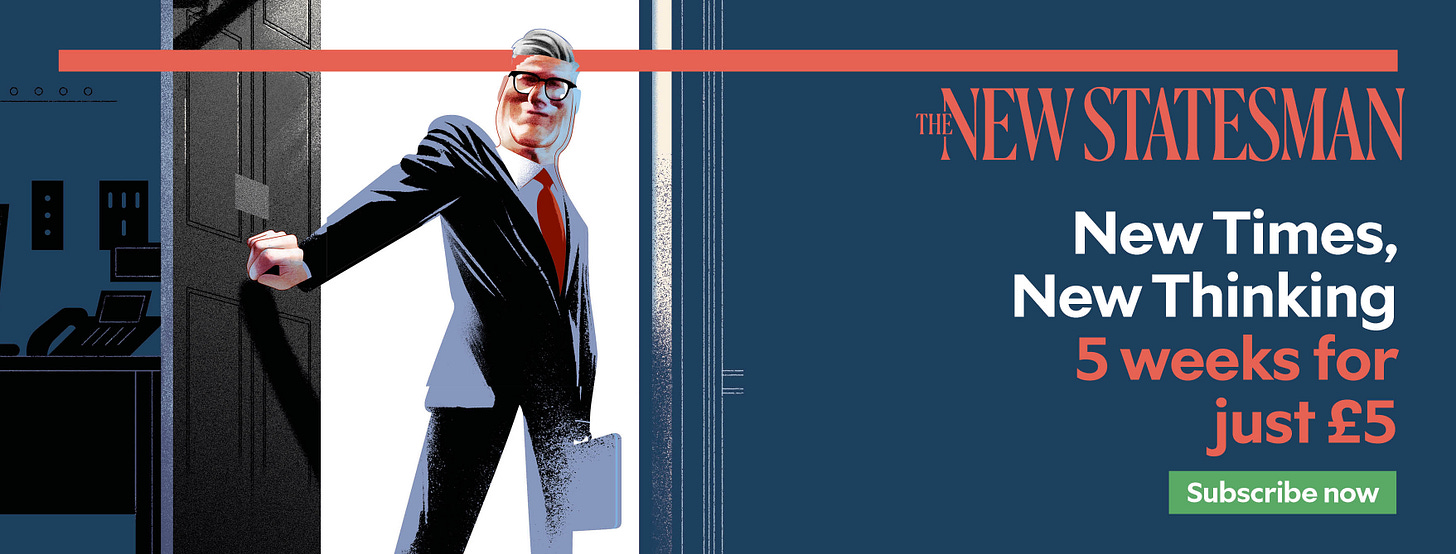Morning Call: What will Diane Abbott do now?
The prospect of a new left party may have emboldened the veteran MP.
Good morning, Rachel here.
It’s been hard to keep track of the news announcements coming this week. There’s been the shock revelations of the Afghan data breach, “Big Bang” reforms to unleash the City to rising inflation, a cosy set-piece announcement on e-passport gates with the German Chancellor Friedrich Merz, and the suspension of four Labour MPs for persistent rebellion. And just when you thought you’d got a handle on all that with just two days to go before recess, veteran left-wing MP (and fierce critic of Keir Starmer) Diane Abbott revived a row over racism and anti-Semitism from two years ago.
The Mother of the House has now been suspended from the Labour Party for the second time over very similar comments. If you want to catch up on the rest of this week’s news, the latest New Statesman podcast does a great job of trying to make sense of everything that’s been going on in a snappy 30-minute episode. As for Abbott, I take a deeper look at the row below.
It has been more than two years since Diane Abbott sent that letter to the Observer, in which she argued that while Irish, Jewish and Traveller people could experience “prejudice”, “they are not all their lives subject to racism”, comparing the impact on their lives to the prejudice faced by “redheads”.
At the time, it looked as though that letter might have ended her political career. Having spent the first years of his Labour leadership attempting to purge the party of the anti-Semitism that had plagued it under Jeremy Corbyn, Keir Starmer’s response was swift. Abbott immediately had the Labour whip suspended – a suspension which lasted almost until the 2024 election, raising questions about whether she would even be allowed to stand again as a Labour candidate in Hackney North and Stoke Newington.
Abbott did stand, winning her tenth election to become the Mother of the House – the honorific for the longest-serving female MP – and a vocal critic of the government. If her letter had not been forgotten or forgiven, it appeared to have been brushed under the carpet, with all concerned thinking it more expedient to move on.
But Abbott seems to have other ideas. In an interview on BBC Radio 4’s Reflections programme, she was asked about her comments in 2023 – and doubled down on them. “Clearly, there must be a difference between racism which is about colour and other types of racism because you can see a Traveller or a Jewish person walking down the street, you don’t know,” she said. “I just think that it’s silly to try [to] claim that racism [that] is about skin colour is the same as other types of racism. I don’t know why people would say that.”
In the aftermath of the original row, Abbott withdrew her remarks and apologised “for any anguish caused”. During her suspension, this apology was noted by those who advocated for her to be readmitted into the Labour party. But asked on Thursday if she regretted the incident, Abbott responded: “No, not at all.” The interview immediately sparked renewed backlash, with calls for her to be suspended again. By the end of the day, it was announced that she had not just had the Labour whip withdrawn, but had also been “administratively suspended” from the Labour Party. An investigation is once again underway.
But we should not be surprised that Abbott does not regret what she said. Her memoir A Woman Like Me, published in September 2024, made it very clear what she thought about both the letter she wrote and how it was received. She wrote then that while her comments may have been “ill-judged” and “clumsy”, she stood by them. As in the Reflections interview, she has tried to make a distinction between visible and less visible characteristics that might put an individual at risk of prejudice (an argument that is interesting to consider in light of the demographics of her constituency, which includes the Hasidic community in Stamford Hill).
Instead of an apology, this passage in the book is an apologia, a defence of the entire incident. The only error Abbott admits to being naive about is what the fall-out might be, which she takes not as a reaction to the implications of what she says but a personal attack: “The vitriol of the response in the press and the public debate surprised me, although perhaps I should have known by that point not to be surprised by any attacks against me in the media.”
If there are any doubts about whether her views might be interpreted as anti-Semitic, she argues these should be cast aside in light of her electoral success in such a seat where a lot of Jewish people vote: “If I really did hate Jewish people, I think that after more than 30 years my neighbours and constituents would certainly have worked that out.” This week’s BBC interview echoes this argument: “I do get a bit weary of people trying to pin the anti-Semitic label on me because I’ve spent a lifetime fighting racism of all kinds and in particular fighting anti-Semitism, partly because of the nature of my constituency.”
This was not a case Abbott made while the investigation into her comments was ongoing and she was waiting for the Labour Party to decide whether to restore the whip. There was some confusion over her status in the run-up to the election, with conflicting reports that Abbott had been banned from standing again for Labour (something she is understood to have found out herself via media reports) or that a deal was being brokered to give her back the whip on the understanding she would not seek re-election.
Whatever the plan may have been, it went awry – and the result was that Abbott did stand again. If the Labour leadership expected gratitude on her part for this decision, they will have been disappointed. Discussing her book at the Cambridge Literary Festival in April this year, Abbott told the audience: “I was elected for the tenth time last year, but that was no thanks to the people around Keir Starmer.”
“I could have stood down last year,” she continued, “but I thought, F you, F you” – a line met with a round of applause. “If I have to crawl back to parliament on my hands and knees, I’m going back.” Abbott did not choose to bring up the comments that had led to her suspension in the first place. But had there been an audience question on it, the answer is right there in the book.
If Abbott felt emboldened to maintain her side of the story now, it is no wonder. Her position was strengthened by winning the row over whether she would be allowed to stand: as Mother of the House and a trail-blazing veteran MP, she has regularly attacked the government in the chamber on issues from Gaza to welfare spending, and up until now has faced no sanction from her party. While the BBC interview was pre-recorded in May before the decision was made this week to suspend the whip from four Labour MPs for persistent disobedience, her comments were always going to send a message to the Labour leadership attempting to stamp out dissent on the backbenches: bring it on. Last time she waited out her suspension quietly, hoping to have the whip restored and to stand again as a Labour MP. But that was in the run-up to an election. This time, there’s a new left-wing party in the works – one potentially led by her long-term ally and close friend Jeremy Corbyn.
Rachel’s picks
Doctors are striking over the shambles that’s been made of their careers, writes the New Statesman's in-house GP Phil Whitaker with reference to his three decades in the NHS.
Who is an acceptable migrant? In a beautiful column that reflects on her father’s story, Anoosh Chakelian grapples with labels like “deserving” and “undeserving”.
Over in Toryland, I’ve interviewed Katie Lam, the Conservatives’ new rising star who thinks her party needs to move on from Margaret Thatcher.
And Pippa Bailey continues to chronicle her journey through grief with piercing clarity, finding a sense of relief at her sewing machine.
From our partners
Cybersecurity vendors are key in enabling organisations to place responsible disclosure at the core of their operations, writes regional director, UK & Ireland, at Fortinet, Richard Woolfrey.
Mailshot
BBC: Trump orders officials to produce more Epstein documents
Times: Serious pollution by water companies rose 60 per cent last year
NY Magazine: Mamdani has awakened a new power
Patrick Maguire: Starmer doesn’t yet have discipline
Ethan Rooney: Is banning left protest the new normal?
Kyle Chayka: Curbing my smartphone addiction
Becca Rothfeld: Anti-autofiction
Ceratosaur fossil auctioned for $30.5m
And with that…
Have a good day and lovely weekend. George will be with you Monday.








Diane Abbott is correct. All she’s saying is that the way black and visible brown people experience racism is different from the discrimination that white Irish and Jewish people experience. Having a very visible different skin colour than white people make you stand out all the time. You walk into a room, people look and go silent. Not always the same for an Irish or white Jewish person. Not the same for white passing black or brown person. There are indeed layers racist experiences. Diane is trying to explain this. It’s her lived experience
Sod that, all the simpletons defending her, she has a track record of antisemitism, there is not tier racism.
And you can certainly see and tell an Irish gypsy and most Jews by looking at them.
Besides, black people seem to hide behind their racism and call it prejudice (it’s a load of bull) we see you.
Just for context, saying a woman champions equal rights whilst her own son a black man is a convicted (yes) convicted racist is pandering to the poor me victim mentality that we all know and see on a daily basis.